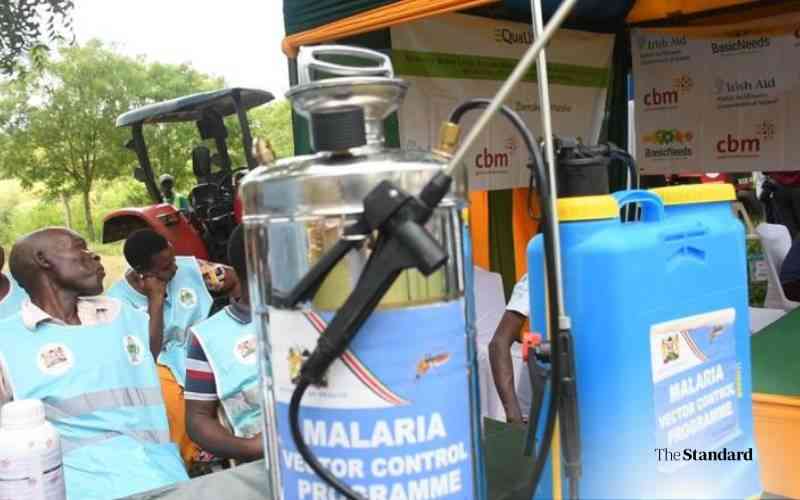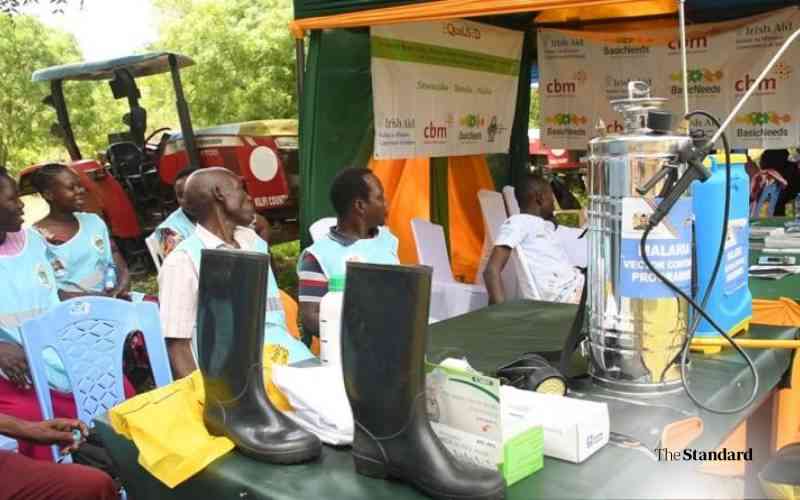
Community health promoters during a malaria and hygiene sensitisation forum at Mwembe Kati village in Chonyi, Kilifi County. June 16, 2025. [Marion Kithi, Standard]
While the rainy season often brings an increase in communicable diseases, Kilifi health officials have reported a remarkable decline in diarrhoea and malaria cases, thanks to community-driven sanitation practices and health interventions.
Malindi sub-county public health officer, Alex Maitha, has attributed the decline to hygiene campaigns.
Maitha said teams of community health promoters have been deployed to various settlements, public places, churches, mosques, water points, and health facilities to promote hygiene standards.
“We have not recorded any cholera outbreaks or unusually high diarrhoea cases despite the rains. Our hospital admissions remain low, indicating strong hygiene awareness among residents,” Maitha stated.

Youths performing during a malaria and hygiene sensitisation forum at Mwembe Kati village in Chonyi, Kilifi County. [Marion Kithi, Standard]
Data from Malindi Sub-County hospital reveals that in May 2025, only 15 children were admitted for diarrhoea-related complications, each from a different household, suggesting isolated sanitation concerns rather than a community-wide outbreak.
"Overall prevalence remains below 1 per cent among children under five years and below two percent for older populations," said Maitha.
Beyond monitoring hospital admissions, he said, health teams have been actively educating the community on waste management, hand hygiene, and clean water practices.
One recurring concern is improper waste disposal, particularly blocked drainage systems caused by discarded diapers.
Maitha has urged residents to dispose of waste responsibly, warning that unsanitary conditions could trigger disease outbreaks if left unchecked.
Meanwhile, malaria prevalence has also significantly decreased from 7 per cent to 5 per cent, largely due to strategic prevention efforts, including cleaning and water drainage, community-wide distribution of mosquito nets, and the use of accurate rapid testing kits.
Community health promoters during a malaria and hygiene sensitisation forum at Mwembe Kati village in Chonyi, Kilifi County. [Marion Kithi, Standard]
Kilifi County malaria programme coordinator, Mr Chimwaga Mwamuye, stressed that early detection and treatment have played a key role in controlling infections.
“Unlike previous years, where many took malaria medication without proper diagnosis, we now ensure everyone gets tested before treatment. This has led to better outcomes and reduced case numbers,” said Mwamuye.
Stay informed. Subscribe to our newsletter
In Kilifi County, most areas are vulnerable due to their proximity to water sources and dense vegetation.
He said that community health promoters have been trained and are leading sanitation and cleaning campaigns in their respective villages.
These efforts, Mwamuye said, have led to a positive shift and reduction in the prevalence of malaria in Kilifi County.
He said the county government, national government, and a UK lobby are running a campaign dubbed 'Love on Site Spring' to spray dams that are breeding grounds for mosquitoes.
The campaigns involve working with stakeholders to support health officers and Community Health Promoters (CHPs) who travel around the community.
Health officials have advised continuous net usage and early treatment-seeking behaviour to keep cases under control.
With public health teams on high alert, the county remains proactive in ensuring communicable diseases do not escalate beyond manageable levels.
Officials have urged residents to prioritise hygiene, treat drinking water, and seek medical care immediately for suspected cases, ensuring long-term community well-being amid the rainy season.